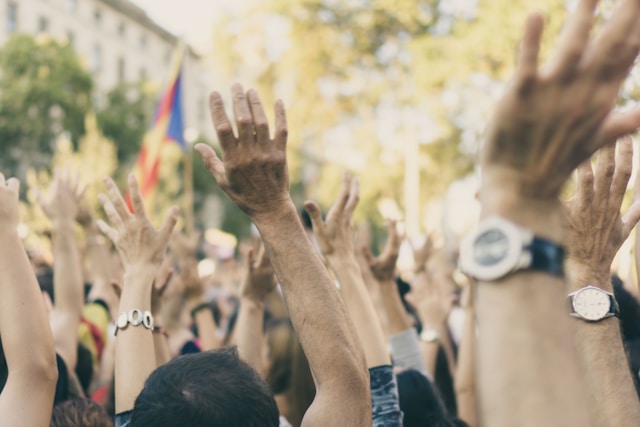
Large crowds expressing xenophobic views publicly can signal that such beliefs are socially acceptable or mainstream, influencing others to think this behavior is normal
Freedom of speech is a cornerstone of democracy. But public protests that give voice to extremist views reveal a troubling trade-off between civil liberties and public safety. Our recent IZA Discussion Paper shows that when protests promote xenophobic ideologies, they can lead to a rise in violence against minorities.
We focus on Germany, where far-right protests, most prominently led by the movement PEGIDA (Patriotic Europeans Against the Islamization of the Occident), have gained momentum. Since the large refugee inflow in 2015, PEGIDA has regularly drawn tens of thousands of demonstrators, making it the largest right-wing movement in Germany since World War II.
Using detailed weekly data from 84 protest locations between 2015 and 2020, we examined the link between PEGIDA protest turnout and hate crimes against minorities. To isolate the causal impact of protest size, we used pleasant weather on scheduled protest days as a quasi-random factor that increases attendance. Our findings reveal that a 25% increase in turnout more than doubles the chance of a hate crime occurring in the same municipality during that week.
The evidence suggests that large crowds publicly expressing xenophobic views can send a powerful signal: that such views are socially acceptable, or even mainstream. This perception can embolden individuals prone to violence to act on their beliefs.
Importantly, these hate crimes are not isolated or impulsive. They are often carried out by known repeat offenders and continue for months after the protests. Moreover, the effect is not limited to protest locations. Violence spreads through social media, especially right-wing networks, and through proximity to other towns. Media coverage and online discussions about PEGIDA protests further amplify the impact.
Another striking finding is the lack of physical counter-protests. While pro-refugee sentiment is visible on social media, particularly on Twitter, in-person demonstrations against PEGIDA are rare. This lack of visible opposition may give the impression that intolerance faces little resistance, further legitimizing extremist views.
Our study highlights an often-overlooked consequence of allowing extremist protests: an increase in violence against minorities. This has serious implications for democracies around the world facing a rise in far-right movements. Even small differences in early support for xenophobic ideologies can put communities on very different paths when it comes to violence.
Policymakers and civil society must confront difficult but essential questions: How can democracies protect freedom of expression without letting that freedom become a shield for inciting violence?
We suggest targeted protections for minorities in areas affected by extremist protests. Media outlets should reflect carefully on how their reporting may inadvertently spread xenophobic messages. And civil society should prioritize building strong, visible, and peaceful counter-narratives, both online and in public spaces, to push back against extremist ideas.
The challenge is to protect dissent, while recognizing when speech begins to erode the very freedoms that democracy promises to uphold.
© Sulin Sardoschau and Annalí Casanueva-Artís
Sulin Sardoschau is Assistant Professor of Economics at Humboldt University Berlin, Germany, and IZA Research Fellow
Annalí Casanueva-Artís is a political Economist Ifo institute Munich, Germany, and Assistant Professor
Please note:
We recognize that IZA World of Labor articles may prompt discussion and possibly controversy. Opinion pieces, such as the one above, capture ideas and debates concisely, and anchor them with real-world examples. Opinions stated here do not necessarily reflect those of the IZA.
Related IZA World of Labor content:
https://wol.iza.org/articles/labor-market-performance-and-the-rise-of-populism by Sergei Guriev
https://wol.iza.org/articles/public-attitudes-toward-immigration-determinants-and-unknowns by Mohsen Javdani
https://wol.iza.org/articles/political-connectedness-and-formal-finance-in-transition-economies by Kobil Ruziev
Foto by Chris Slupski on Unsplash